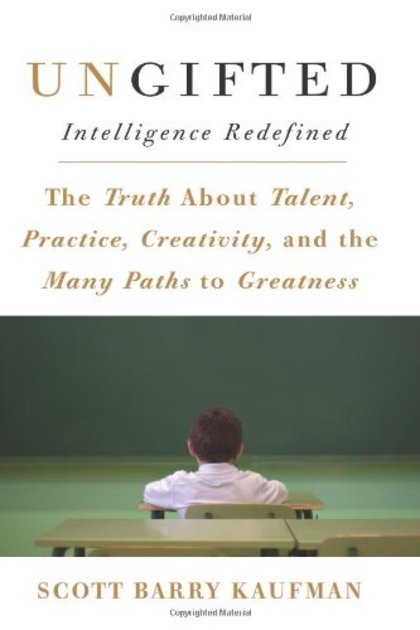
Originally published Queens Jewish Link 2016
Ungifted: Intelligence Redefined by Scott Barry Kaufman
Ungifted isn't a practical self-help book, but I am so excited to share what I got from it. Kaufman looks at concepts surrounding intelligence and how we typically define it. The author weaves in his personal story about ability and success; you can't help but feel the passion he has for the topic. Kaufman was diagnosed with a learning disability when he was young, and was put into special education. However, with persistence, he overcame his label and became a cognitive psychologist and researcher.
The traditional way of measuring intelligence is through IQ testing. IQ was formed to help predict intelligence and giftedness. However, much like standardized testing, the intention of IQ differs from the result: scores are more a function of the ability to do well on the test, as opposed to being an accurate measure of intelligence. Survey studies have shown that comparing individuals' early IQ scores do not correlate significantly with their eventual achievement and success. In other words, high IQ scorers who may be considered gifted, you would think make up the intellectual elite, making great discoveries and winning Nobel prizes. However, this isn't true.
Kaufman further discusses how, besides for IQ not being an accurate measure of intelligence, the culture of labeling ability and disability through testing implies a fixed mindset, which is detrimental to development. Fixed mindset refers to the perspective that traits and abilities are unchanging and unchangeable, meaning you are born with a certain set of abilities and potential and that's what you get. Growth mindset, on the other hand, is the perspective that traits and abilities can always be improved and worked on. Guess which mindset motivates individuals to improve and actually do better? Simply having a growth mindset means that you are more likely to work on yourself, practice, and eventually improve your abilities and be successful. Instead of looking at talent as a fixed trait, it would be more conducive to success if you see talent as a possible predisposition to an area, but requires extensive practice and passion to master. People who see themselves in a growth mindset are more likely to practice and persist, and therefore have more grit to get things done and succeed.
After take a careful look at the concepts of IQ and intelligence as we think of it, Kaufman suggests his own Theory of Personal Intelligence: The dynamic interplay of engagement and abilities in pursuit of personal goals. This theory of intelligence focuses on each individual and their goals, as opposed to comparing and ranking. Ability and talent don't operate in a vacuum; they only exist in combination with engagement and action. You can be talented and smart, but if you don't use it, it can go to waste or not be as developed. Furthermore, increased engagement leads to increased ability: The more you practice and use your talents, the more skilled you will get. People who decide to persist and develop grit will be able to increase and advance their abilities. (Even grit doesn't have to be a fixed trait.) Therefore, measuring intelligence in the linear way that we often do leaves out the myriad possibilities that individuals can create and become.
From this research, it seems like nurturing persistence and grit for children is more important than nurturing giftedness. Awhile ago in this column, I reviewed the book Grit by Angela Duckworth, whose research is mentioned in Ungifted. Ungifted puts the concept of grit into perspective: Firstly, one doesn't need to be born with the trait of grit; one only has to operate under a growth mindset and nurture grit in themselves. Secondly, grit can now be seen as not only a good trait, and a trait for success, but also a trait that means intelligence.
This book has made me really excited about the many possibilities open to each child. The deep respect the author has for everyone with diverse abilities has influenced me to focus more on strengths of the children I work with.
 Previous
Previous
